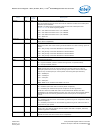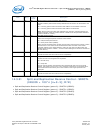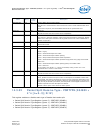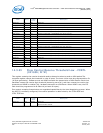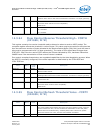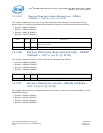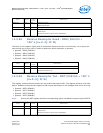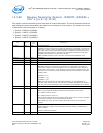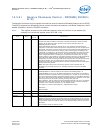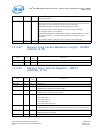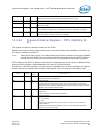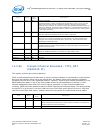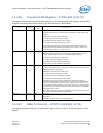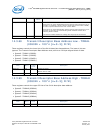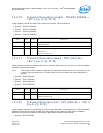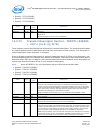
Receive Checksum Control - RXCSUM (05000h; R/W) — Intel
®
82575EB Gigabit Ethernet
Controller
324632-003 Intel
®
82575EB Gigabit Ethernet Controller
Revision: 2.1 Software Developer’s Manual and EEPROM Guide
January 2011 361
14.3.61 Receive Checksum Control - RXCSUM (05000h;
R/W)
The Receive Checksum Control register controls the receive checksum offloading features of the 82575.
The 82575 supports the offloading of three receive checksum calculations: the Packet Checksum, the IP
Header Checksum, and the TCP/UDP Checksum.
Note: This register should only be initialized (written) when the receiver is not enabled (for
example, only write this register when RCTL.EN = 0b)
Field Bit(s)
Initial
Value
Description
PCSS 7:0 0h Packet Checksum Start
Controls the packet checksum calculation. The packet checksum shares the same
location as the RSS field and is reported in the receive descriptor when the
RXCSUM.PCSD bit is cleared.
If RXCSUM.IPPCSE cleared (the default value), the checksum calculation that is
reported in the Rx Packet checksum field is the unadjusted 16-bit ones complement of
the packet. The packet checksum starts from the byte indicated by RXCSUM.PCSS (0b
corresponds to the first byte of the packet), after VLAN stripping if enabled by the
CTRL.VME. For example, for an Ethernet II frame encapsulated as an 802.3ac VLAN
packet and with RXCSUM.PCSS set to 14, the packet checksum would include the
entire encapsulated frame, excluding the 14-byte Ethernet header (DA, SA, Type/
Length) and the 4-byte VLAN tag. The packet checksum does not include the Ethernet
CRC if the RCTL.SECRC bit is set. Software must make the required offsetting
computation (to back out the bytes that should not have been included and to include
the pseudo-header) prior to comparing the packet checksum against the TCP
checksum stored in the packet checksum is aimed to accelerate checksum calculation
of fragmented UDP packets.
Note: The PCSS value should not exceed a pointer to the IP header start. If
exceeded, the IP header checksum or TCP/UDP checksum will not be calculated
correctly.
IPOFLD 8 1b IP Checksum Off-load Enable
RXCSUM.IPOFLD is used to enable the IP Checksum off-loading feature. If
RXCSUM.IPOFLD is set to 1b, the 82575 calculates the IP checksum and indicates a
pass/fail indication to software via the IP Checksum Error bit (IPE) in the Error field of
the receive descriptor. Similarly, if RXCSUM.TUOFLD is set to 1b, the 82575 calculates
the TCP or UDP checksum and indicates a pass/fail indication to software via the TCP/
UDP Checksum Error bit (TCPE). Similarly, if RFCTL.IPv6_DIS and
RFCTL.IP6Xsum_DIS are cleared to 0b and RXCSUM.TUOFLD is set to 1b, the 82575
calculates the TCP or UDP checksum for IPv6 packets. It then indicates a pass/fail
condition in the TCP/UDP Checksum Error bit (RDESC.TCPE).
This applies to checksum offloading only. Supported frame types:
Ethernet II
Ethernet SNAP
TUOFLD 9 1b TCP/UDP Checksum Off-load Enable
Reserved 10 0b Reserved
CRCOFL 11 0b CRC32 Offload Enable
Enables the CRC32 checksum off-loading feature. If RXCSUM.CRCOFL is set to 1b, the
82575 calculates the CRC32 checksum and indicates a pass/fail indication to software
via the CRC32 Checksum Valid bit (CRCV) in the Extended Status field of the receive
descriptor.
In non I/OAT, this bit is read only as 0b.



